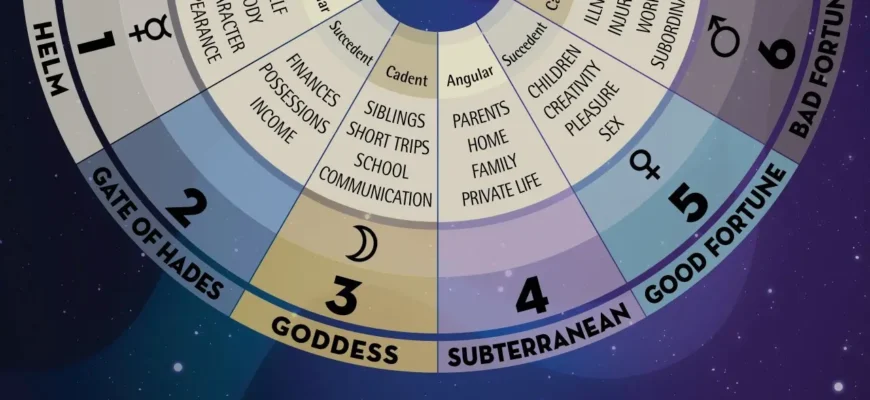The Second House, also known as the House of Wealth and Possessions, governs personal resources, material possessions, and the way a person acquires and manages them. In astrology reading, this house highlights financial habits, self-worth, and appreciation for both tangible and intangible assets. Through astrology interpretation, the Second House reveals how effort, discipline, and personal values contribute to building positive wealth, distinguishing earned resources from inherited or gifted assets, which are associated with the Eighth House.
By analyzing the Second House in a free birth chart, astrologers can uncover patterns related to money management, value systems, and self-evaluation, providing insight into a person’s financial stability and sense of security. This house emphasizes the connection between material resources, personal effort, and self-esteem, showing how conscious decisions and hard work shape the accumulation of wealth and the appreciation of what one possesses.
The “Second House” represents material survival and values
If the first house is the seed of life, the second house is the cradle that nurtures life. The basic model of this cradle is the sign next to the rising sign. For example, if the rising sign is Virgo, the second house is Libra; if the rising sign is Taurus, the second house is Gemini.
The second house represents all “basic needs for survival,” such as food, clothing, and other personal resources. It represents the tangible, material environment and the resources we receive from childhood, cultivating the habits of material needs and the sense of security and satisfaction we derive from them.
In addition, from the perspective of money, the second house belongs to “positive wealth” , so if the second house is good, the person is usually more able to accumulate wealth.
Positive Second Palace Development
We can achieve a balance between our own labor, time, and creative endeavors, and our actual monetary income. This allows us to use our earnings moderately for purchases, reward our hard work, and feel that our lives are fulfilling and meaningful through a rich material life.
Negative Second House Development
1. They place great value on financial security, being reluctant to spend money no matter how much they earn.
2. They have an overly materialistic desire, desperately purchasing or collecting things, attempting to fill the void in their lives with material possessions.
3. They underestimate their own worth, believing they don’t deserve any reward or compensation for their time and effort. This is primarily due to a lack of self-worth or resentment stemming from being exploited by others.
Key topics
Personal resources, self-worth, financial status, money transactions, financial advice, material enjoyment, food and shopping, work partners, lifestyle, manufacturing, personal desires, assets and wealth
Comprehensive Analysis
The second house represents the way a person makes money.
It is the material reward we get in exchange for our labor, skills, time and other talents. It represents our “way of making a living” and is the “positive income” that we get what we sow.
For example, the Sun in the 2nd house indicates a father who generously expended money to support the individual’s growth and development, demonstrating his strong desire and ability to make money. Consequently, the individual identifies with his father’s values regarding money-making methods and resource utilization, believing that earning a living through one’s own abilities is a form of self-expression. The Sun in the 2nd house suggests a belief that “money is power” and that dignity is conferred by wealth. Consequently, the individual strives to become a bourgeois individual with strong earning power and a strong desire for consumption.
The Moon in the Second House indicates a mother who, from a young age, expressed her care and love by providing resources like food and toys. This also suggests that the individual, from a young age, experienced her mother’s sensitivity and anxieties about money. As a result, this individual may pursue a career related to women or earn money through the production of consumer goods. Money becomes an emotional dependency, leading to indecision about how to make money and anxiety about financial gains and losses. The Moon in the Second House suggests a commitment to the concept of “small wealth comes from frugality,” and while not ambitious financially, this individual believes in the slow, steady accumulation of wealth.
The second house represents our attitude towards money and the things we want to own.
It means “where we spend our money” and also represents our liquid assets, including personal bank accounts and services that we think are “worth” spending money on.
For example, if the Sun is in the 2nd house, one’s spending attitude is generous and uninhibited, such as enjoying treating others and seeking recognition for their ability to spend. The Sun in this house will identify with and cultivate skills that can make money, and will be willing to spend a lot of money on courses.
People with the Moon in the second house are cautious in their attitude towards spending money, giving people the impression of being petty. They will maintain their frugal habits, believe in making money and managing finances by accumulating small amounts, and accumulate small items that carry emotional memories as decorations.
The second house represents our evaluation of our own abilities.
A person’s means of earning a living mature over time and through experience. The second house represents our confidence in our knowledge and skills in society and our expectations of the rewards we can earn. If masculine planets such as the Sun, Mars, Jupiter, Uranus, or Pluto are in the second house, this signifies a desire for highly independent and well-paid work, fostering a high sense of self-worth through financial gain. Conversely, if feminine planets such as the Moon, Saturn, or Neptune are in the second house, this signifies an overly compromising attitude towards others and a feeling that the rewards earned through one’s abilities are often undervalued.
The second house represents a person’s actual productivity and capital strengths.
This encompasses not just monetary wealth but also our abilities, strengths, and the tangible resources we control. Planets in the second house represent our ability to be relied upon by others, our perceived worth, and the value others place on us. Therefore, those with planets in the second house often achieve a certain kind of social recognition through concrete production and material accumulation.
For example: Uranus in the second house represents an individual’s attitude towards money and material things, showing innovative ability and inventive expertise, and having a subversive nature in making money in exchange for the necessities of survival; Neptune in the second house represents the ability to dream and performance expertise, and has intuitive inspiration or artistic spirituality in using money, fulfilling ideals or self-sacrifice; Pluto in the second house represents transformation ability and manipulation expertise, and can deeply control or destroy and rebuild money and finances, realize self-worth and gain social attention.
The second house shows what we value most.
The intangible meaning of the second house is personal values, which include the things we identify with and are an extension of ourselves. For example, money and finances are often the things that sustain us, and our attitude towards money, finances, or resources and how we spend them directly reflect what we value most.
For example, if Saturn is in the second house, people will use money and handle materials with a cautious attitude, not allowing themselves to waste. They will try their best to spend money “wisely” and use resources efficiently. If Neptune is in the second house, people may handle money and materials with an idealistic attitude, making money easily without pressure, but they are also prone to spending money casually.







